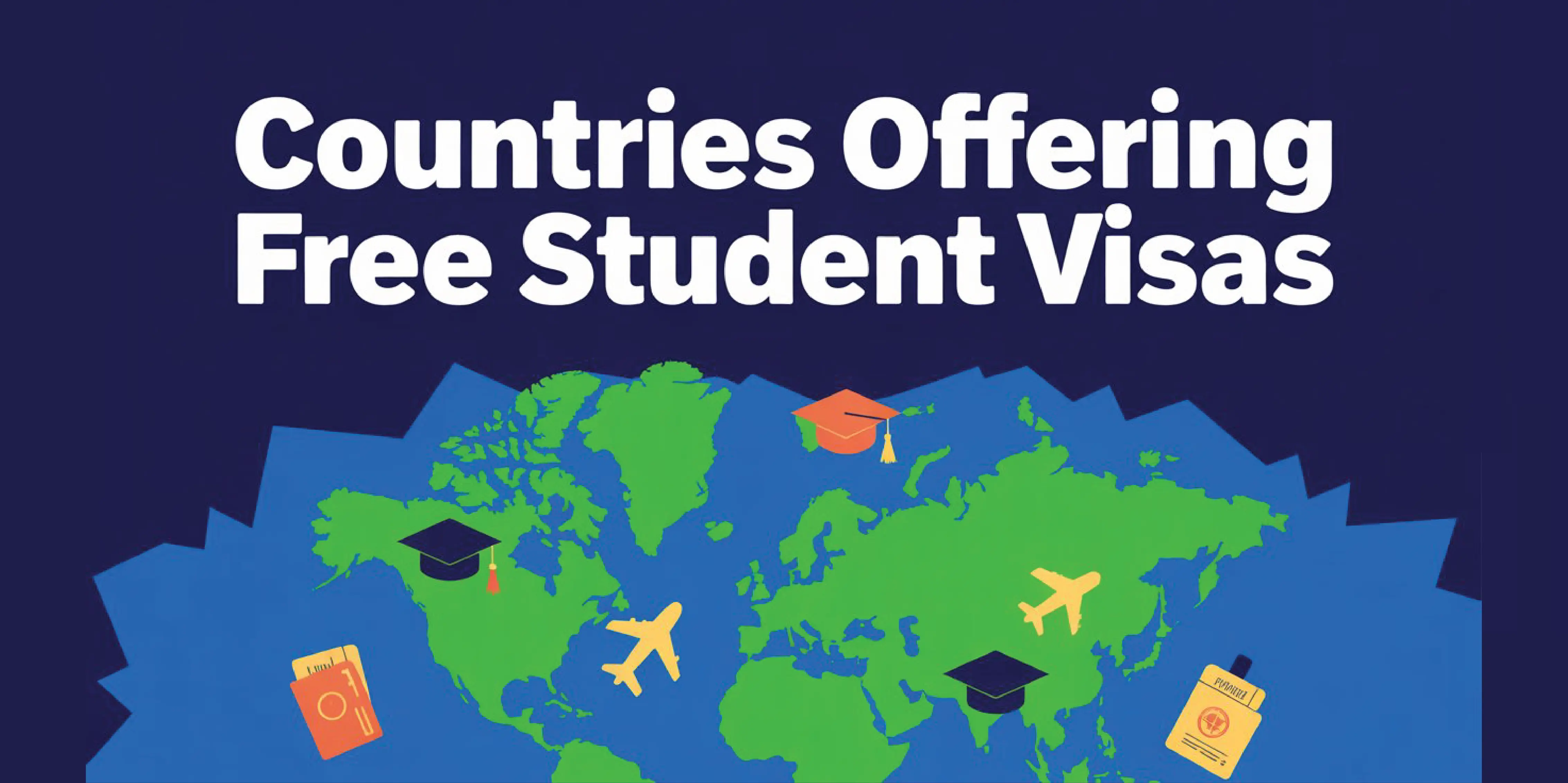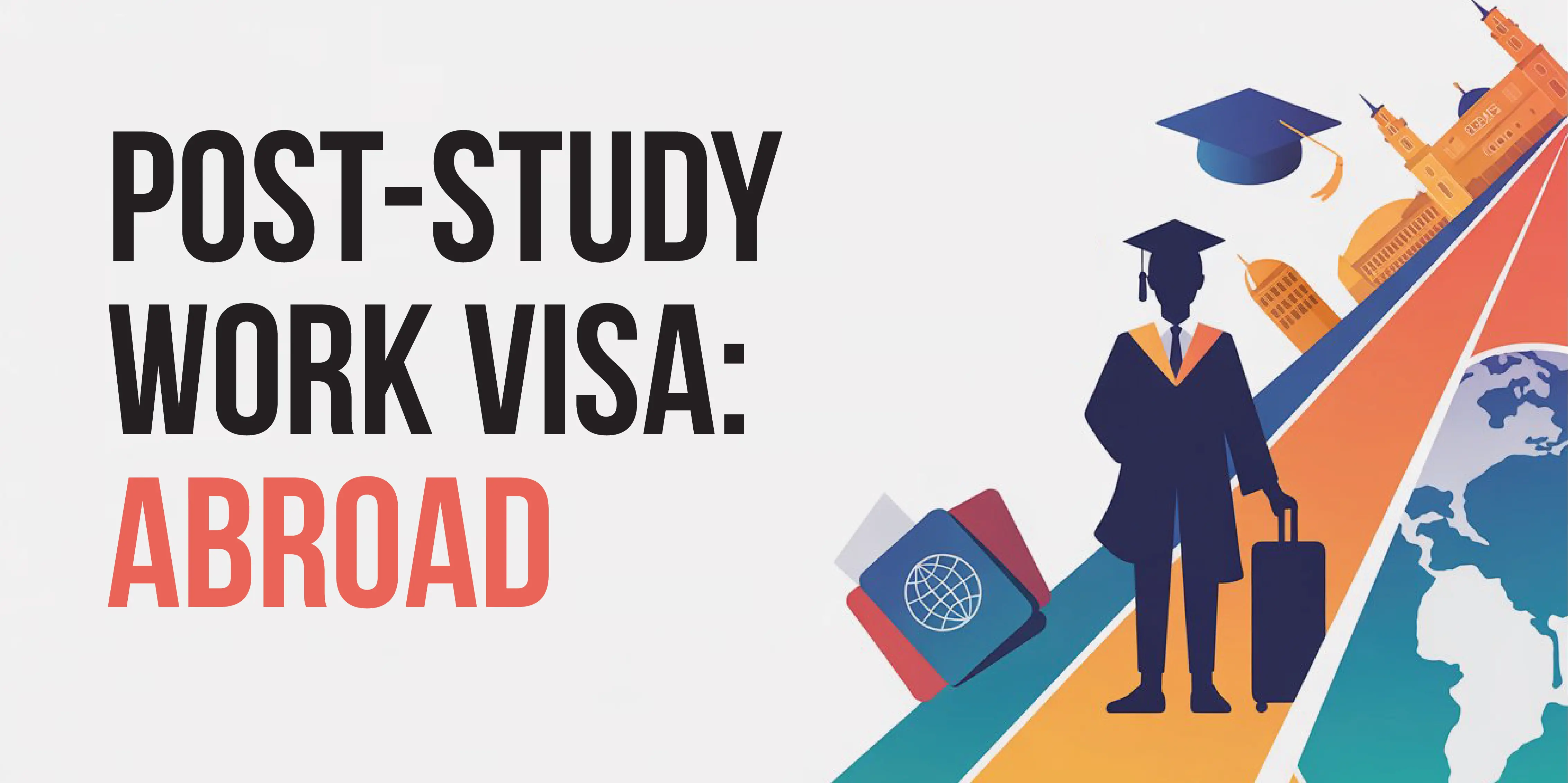https://www.wemakescholars.com/blog/countries-offering-free-student-visas-to-study-abroad
Free Student Visas for International Students
Study Abroad Visa | Updated on ()

HEST 2026
India's Largest Higher
Education Scholarship Test
Total Scholarships up to 2 Cr
Know more and Apply
Registrations close in
Studying abroad is one of the most valuable experiences a student can have. But sometimes tuition and visa processing fees can be a financial burden. Luckily, some countries offer free student visas, allowing students to access high-quality education without the burden.
In this blog, let’s find out about the countries where international students do not need to pay for their visa application.
Why Free Student Visa Matters
-
Opting for countries with a free student visa can reduce your study-abroad costs.
-
By choosing countries that offer free visa entry, not only will you save money, but also get a faster application process.
-
Additionally, studying abroad in these countries offers government-funded scholarship opportunities and affordable public universities, making them the best options for your money.
Countries Offering Free Student Visas
Germany
There is some good news for you if you have been dreaming about studying in Germany. Students taking part in short-term programs are not required to pay visa fees. Students can apply for a Gratis Visa, which waives the standard fees.
This applies to short-term research, summer programs, and student exchanges for up to 90 days.
What does a Gratis Visa Cover
The gratis visa is designed for short-term academic programs. The students can use it for:
-
Student exchange programs
-
Short research internships
-
School or college visits
-
Cultural exchange programs
The Gratis Visa does not cover full degree programs, which include bachelor's, master's, and PhD studies.
If the students want to stay longer than 90 days for a degree, then they have to apply for the standard visa.
How to apply for a Gratis Visa
-
Fill the online application form.
-
Gather all the supporting documents, such as the admission letter, passport, and proof of funds.
-
Book an appointment at the German Embassy, Consulate, or authorised VFS Global Centre.
-
Submit your application and biometrics.
Norway
Norway welcomes all international students, even if you are not part of the EU/EEA. We know Norway is part of the EEA. This means that EU/EEA/EFTA nationals can study in Norway without a student visa.
If your study program will last more than three months, then you need to register with the local police within the first three months.
Students from Nordic countries can study in Norway without a study permit.
If your stay will last longer than six months, then you'll need to report your move to the National Registry.
Citizens from most countries outside the EU/EEA/EFTA need to apply for a student visa and must pay an application fee.
General Application Process for non-EU/EEA/EFTA citizens
-
Pay the application fee of NOK 5400 ( Rs 47602 in Indian Currency)
-
Show the acceptance letter
-
Prove that you have sufficient funds of at least NOK 13,790 per month (Rs 121504 in Indian Currency)
-
Provide a letter showing that your college or university is registered with NOKUT.
-
Present a rental contract or housing agreement.
Present these documents at your local Norwegian embassy or consulate.
Sweden
Studying in Sweden is free of charge for citizens of the EU/EEA and those with a permanent Swedish residence permit.
Students from the EU/EEA can study in Sweden without any visa requirements. If you are from outside the EU/EEA, you need to obtain a student visa.
If you are staying more than three months and are not an EU citizen, you need a residence permit.
Requirements to get a residence permit
-
Have a valid passport
-
Must be admitted to full-time studies
-
Paying the tuition fees before applying
-
Applying for health insurance
-
Must be able to support yourself financially
Czech Republic
Applying for a Czech student visa is a vital step for many international students. To make the process easier, we have outlined the key points and requirements.
EU/EEA/Swiss students do not require a visa to study in the Czech Republic, though they must report their stay to the local Foreign Police if it lasts over 90 days.
Non-EU/EEA students must apply for either a long-term visa or a long-term residence permit, depending on the length of their studies.
For non-EU students, there are two types of visas:
-
A long-term visa for study purposes, which is valid up to one year.
-
Long-term residence permit for study purposes for programs lasting longer than a year.
Documents Required for a Czech Student Visa
-
Visa application form
-
University acceptance letter
-
Proof of accommodation
-
Proof of financial means
-
Valid passport
Mexico
For students aspiring to pursue higher education abroad, Mexico presents an attractive destination with its affordable tuition fees and quality education.
- There are two types of Mexican student Visas
- Temporary Resident Student Visa for courses longer than 180 days
- Visitor Student Visa for courses shorter than 180 days.
The Mexican Government Scholarship covers visa fees as part of its scholarship program. The details of the scholarship are as follows:
- Program level: Undergraduate, Bachelor’s, Master’s, Doctoral, Post Doctorate
- Scholarship Duration:
-
Undergraduate Program: Up to 24 months
-
Master’s Program: Up to 24 months
-
Doctoral Program: Up to 36 months
-
Research stays: Up to 12 months
-
Eligibility Criteria for the Mexican Government Scholarship
-
Applicant must be a citizen of one of the eligible countries.
-
Should not be residing in Mexico at the time of application.
-
Students must meet the academic and language proficiency requirements.
-
Not have received any scholarship from a Federal Government institution in the previous year.
Documents Required:
-
Scholarship application form
-
A letter detailing the reasons that motivate you to carry out the studies or research in Mexico
-
Resume
-
Letter of academic acceptance from the Mexican institution recipient
-
Letter of commitment to return to the country of origin.
-
Copy of the birth certificate.
-
Copy of the valid passport
-
Copy of the medical certificate issued by a public institution or private health provider, with a maximum of 3 (three) months before the presentation of the application, indicating that the Applicant is in good health.
-
If Spanish is not the applicant’s mother tongue, a copy of proof of advanced knowledge of the Spanish language issued by any university or educational centre, guaranteeing a minimum level of B2 within the Common Framework European Reference.
-
A letter in which the applicant states under protest to say the truth, that the information provided is true.
Malaysia
The advantage of studying in Malaysia, besides affordable education, is the availability of scholarships.
There are various government-approved and university-funded scholarships available. Here is a list of scholarships that you can apply for.
-
Malaysia International Scholarship
-
NAC Arts Scholarship
-
Malaysia Commonwealth Scholarship
-
Malaysian Government MTCP Scholarship
-
Graduate Research Scholarship Program
How to apply for a Scholarship in Malaysia
-
Check eligibility criteria
-
Choose your university and course
-
Gather your documents
-
Apply online
-
Prepare for the interview
Benefits of studying in a Visa-Free Country
-
No embassy appointments or interviews
-
Faster admission
-
Lower cost as there are no visa fees
-
Fewer rejected applications
-
Greater flexibility for shorter duration programs
Tips for Applying for Free Student Visas
-
Apply through government or partnered programs
-
Check for country-specific agreements
-
Apply early
-
Build a strong application
Conclusion
Choosing a country that offers a free student visa and affordable education can make studying abroad much easier. Germany, Norway, Sweden, the Czech Republic, Mexico, and Malaysia not only provide excellent academic opportunities but also help reduce financial burdens by waiving visa fees and offering low tuition through scholarships.




Kindly login to comment and ask your questions about Scholarships & Education Loans